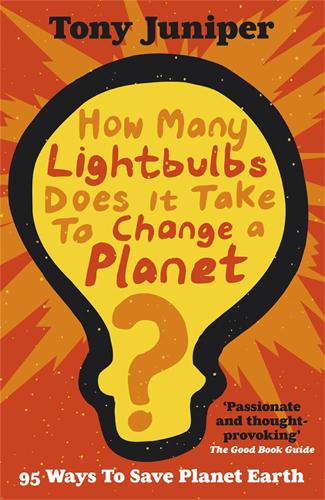
How Many Lightbulbs Does It Take To Change A Planet: 95 Ways to Save Planet Earth
(Paperback)
Publishing Details
How Many Lightbulbs Does It Take To Change A Planet: 95 Ways to Save Planet Earth
By (Author) Tony Juniper
Quercus Publishing
Quercus Publishing
10th January 2008
United Kingdom
Classifications
General
Non Fiction
363.738746
Physical Properties
Paperback
304
Width 131mm, Height 196mm, Spine 19mm
386g
Description
The human world sits on the brink of potentially catastrophic environmental change. If we do not drastically reduce greenhouse gas emissions, and start that process now, it is projected that in the second half of the 20th century the cost of climate damage could amount to a fifth of global GDP.
The latest science confirms that there is now only a decade left for action. How Many Lightbulbs Does it Take to Change a Planet is a clarion call for urgent action in the face of environmental change that threatens to devastate human societies. In it Tony Juniper, director of Friends of the Earth for England and Wales, presents his programme for staving off environmental, economic and social disaster. His '95 articles for comfort, security and survival' embrace actions needed to reduce carbon emissions and protect the Earth's natural ecosystems, measures required to establish sustainable farming methods and conserve agricultural biodiversity, and wider economic reforms needed to create a proper economic context for environmental sustainability and to make quality of life - rather than growth in GDP - the target outcome of economic activity.Passionately written and cogently argued, How Many Lightbulbs Does it Take to Change a Planet is essential reading for anyone who cares about the world our children will inherit.Reviews
It would be hard not to find much to agree with...he is not afraid to think big - Daily MailHis proposals for global strategies are thoughtful, idealistic, rational and pure of heart - The TimesPassionate and thought-provoking - The Good Book GuideHis manifesto contains ideas that are so rational, thoughtful and obvious that you are surprised that they are not already up and running - Sunday Tribune
Author Bio
Tony Juniper is Executive Director for Friends of the Earth (England, Wales and Northern Ireland) and Vice Chair Friends of the Earth International. He is the author of Spix's Macaw: The Race to Save the World's Rarest Bird (2002)
